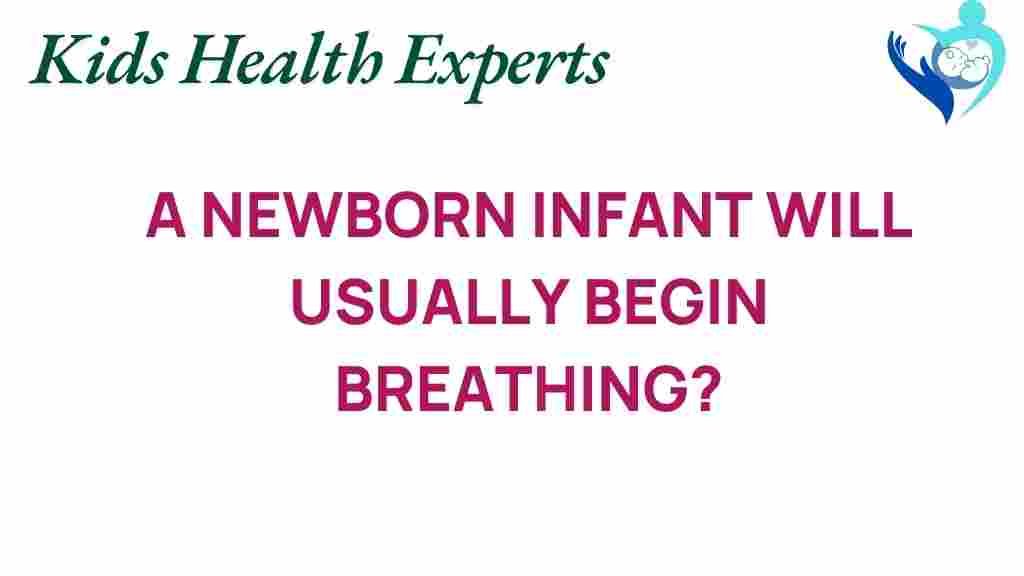When Do Newborn Infants Typically Take Their First Breath?
Understanding newborn breathing is crucial for parents and caregivers as it directly impacts infant health and development. The moment a baby takes its first breath is a significant milestone in newborn development, marking the transition from life inside the womb to the outside world. This article delves into the fascinating process of how newborns breathe for the first time, the importance of their respiratory system, and essential insights into neonatal care.
The Transition from Fetus to Newborn
Before we explore when newborns take their first breath, it’s essential to understand the environment in which they develop. Inside the womb, the fetus relies on the placenta for oxygen and nutrient supply. The lungs are filled with fluid, and the baby’s circulatory system is adapted to this unique setting.
Key Changes at Birth
At birth, several critical changes occur in the newborn’s body:
- Fluid Clearance: As the baby is born, fluid in the lungs is expelled, preparing the respiratory system for breathing air.
- First Breath: The first breath typically occurs within seconds after the baby is delivered, initiating independent breathing.
- Circulatory Adjustments: Blood flow changes as the umbilical cord is cut, redirecting blood to the lungs for oxygenation.
The Timing of the First Breath
Newborn breathing usually begins within the first minute after birth. However, the exact timing can vary based on several factors:
Factors Affecting First Breath Timing
- Delivery Method: Vaginal births often stimulate the baby to take its first breath quickly due to the compression of the chest during delivery.
- Health of the Infant: Premature infants or those with certain health issues may take longer to breathe independently.
- Environmental Conditions: The presence of medical staff and the immediate post-delivery environment can influence the timing.
Most healthy newborns will take their first breath within 30 seconds to 1 minute of birth, which is a critical moment for their respiratory system.
The Importance of Newborn Breathing
The first breath is more than just a simple act; it signifies the initiation of multiple vital processes:
Impacts on Infant Health
- Oxygenation: The first breath allows the newborn to start receiving oxygen, essential for survival and growth.
- Carbon Dioxide Expulsion: It also helps expel carbon dioxide, balancing the body’s pH levels.
- Stimulating Lung Development: Breathing air stimulates the lungs to expand and develop fully.
Inadequate or delayed first breaths can lead to complications, making neonatal care crucial during this period.
Neonatal Care and Monitoring
Proper care immediately after birth is vital to ensure that the newborn’s respiratory system is functioning correctly. Here are some essential steps taken by healthcare professionals:
Step-by-Step Process of Neonatal Care
- Assessment: Medical staff assess the newborn’s breathing effort and overall appearance.
- Airway Clearance: If necessary, they clear the airway to ensure the baby can breathe freely.
- Stimulation: Gentle stimulation may be provided to encourage breathing.
- Monitoring: Continuous monitoring of the baby’s heart rate and oxygen levels is conducted.
- Intervention: In cases of distress, interventions such as supplemental oxygen or resuscitation may be necessary.
Parents and caregivers should know these steps to be prepared for any situation that may arise during the critical first moments of their baby’s life.
Common Concerns About Newborn Breathing
New parents often have questions about their newborn’s breathing patterns. Here are some common concerns:
Understanding Normal vs. Abnormal Breathing
- Normal Breathing: Newborns typically breathe 30 to 60 times per minute, with irregular patterns being common.
- Signs of Distress: Watch for signs like grunting, flaring nostrils, or retractions (pulling in of the chest). These may indicate breathing difficulties.
- Apnea: Brief pauses in breathing are common in newborns, especially preterm babies, but should be monitored closely.
If you notice any concerning signs, consult your pediatrician for advice and further evaluation.
Pediatric Insights on Newborn Breathing
Healthcare professionals emphasize the importance of understanding newborn breathing for the overall health and development of infants. Here are a few insights:
The Role of Pediatricians
- Routine Check-Ups: Pediatricians will monitor your baby’s growth and respiratory health during routine check-ups.
- Education: They provide valuable education on what to expect regarding your newborn’s breathing patterns.
- Proactive Care: Early detection of potential issues can lead to prompt care and better outcomes.
It’s essential for parents to engage with their pediatricians and ask questions regarding their baby’s respiratory health and development.
Conclusion
The moment a newborn takes their first breath is a remarkable transition that signifies the beginning of independent life. Understanding newborn breathing is crucial for ensuring optimal infant health and development. Through proper neonatal care, monitoring, and education, parents can support their newborns as they adapt to their new environment.
Remember, if you have any concerns about your baby’s breathing or overall health, don’t hesitate to reach out to your healthcare provider. For more information on baby care and pediatric insights, check out this helpful resource.
For further reading about respiratory health in newborns, visit this external link.
This article is in the category Care and created by KidsHealthExperts Team
